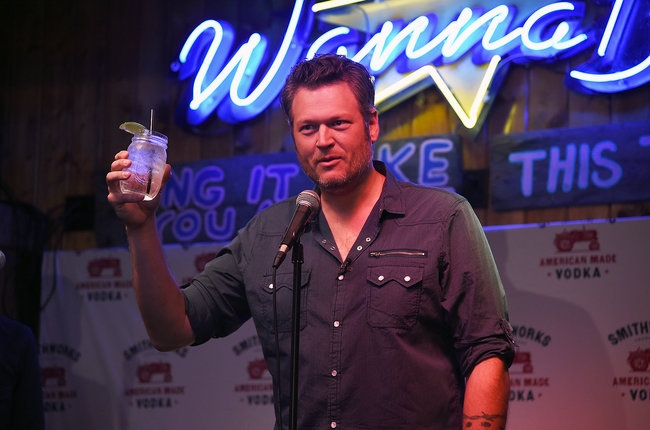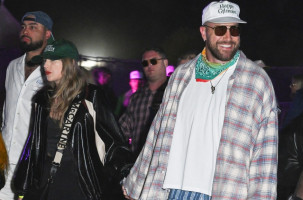"One hundred years from now, [our bottle] could be sitting on a table," said Borchetta, just one of several country music figures pitching their spirits at the CMA Fest. "If we do this right, this culture outlives all of us."
Country music raised a figurative red Solo cup to day drinking during the CMA Music Festival in Nashville June 8-11.
At least five artists and one record label promoted new brands of whiskey, vodka or wine as the music business and the beverage industries converged. Blake Shelton introduced Smithworks vodka with a pre-festival karaoke event at WannaB’s on Lower Broadway. Darius Rucker’s Backstage Southern Whiskey occupied a booth in the Fan Fair X convention area at the Music City Center. Sara Evans rolled out a limited-edition run of OneHope cabernet at a City Winery, while Little Big Town threw a “Day Drinking” party to celebrate its new retail products, including 4 Cellars wine. Florida Georgia Line opened a new restaurant, the FGL House, which provides a space to sell its still-new Old Camp Whiskey. And the Big Machine Label Group offered free taste tests of Big Machine platinum-filtered vodka.
In an era when music is increasingly marketed digitally, alcohol is an indisputably physical product, and that’s an appealing touch point for music and spirits to merge.
“It’s almost a throwback to what we grew up doing in the record business,” says BMLG president/CEO Scott Borchetta. “We found so many parallels because it’s about having a great product and marketing. That’s what my whole life has been about. So we think it’s a really great addition to our label group, and we think it’s consistent with our culture.”
Indeed, Big Machine act Midland’s debut single, “Drinkin’ Problem,” underscores the connection between the country genre and alcohol, which has found its way into plenty of other country titles, including Chris Stapleton’s “Tennessee Whiskey,” Eric Church’s “Drink in My Hand,” Toby Keith’s “Whiskey Girl,” Brad Paisley’s “Alcohol” and Shelton’s “Sangria.”
“People know I drink,” says Shelton, illustrating the easy connection his fans will be able to make with his new Smithworks product. “I don’t know if you’ve heard or not, but I do. And vodka is my drink, so I was passionate about it.”

Because of that passion, neither Shelton nor his peers were particularly hard-pressed to do the research on their brands. “It was torture,” says Evans with obvious sarcasm.
But they couldn’t afford to be lazy about it either, because the market for alcohol is at least as difficult to crack as that for music. A significant portion of music fans is ever-hungry for new songs and new artists to consume, making them open to new products. But once a drinker becomes loyal to a particular brand, it becomes increasingly difficult to get them to change their habits. That factored heavily into Rucker’s approach to creating his Backstage brand.
Because of his name recognition, he “can get people to try it, but if a product’s not good, we’re only going to be able to sell it once,” says Daniel Rickenmann, one of Rucker’s partners. “That’s not going to help us. We’ve got to be able to sell it two times, three times, four times.”
Adding to the difficulty is the challenge of bringing alcohol to market. Spirits are heavily regulated, and each state has its own set of codes, creating a labyrinth of red tape that must be navigated to get a drink from the distillery into the hands of the consumer.
“I can’t imagine what it’s like to try to break into the alcohol industry,” says Shelton. “I know how hard it is to break into the country music industry, but that’s a next-level thing.”
No doubt, that’s part of the reason that entertainment figures are increasingly brought into alcohol partnerships. They have direct access to a fan base and can help bring attention to the product. But it only works if the artist and brand align, so the product — including the flavor profile, the packaging and the back story — has to be authentic. Thus, the Florida Georgia Line whiskey uses peach and pecan flavors associated with Georgia and Florida. The Big Machine vodka uses platinum filtration, creating a through line to a record company that has launched several multiplatinum acts. And Evans’ product is directly related to a ritual she enjoys with her husband, Jay Barker.
“When Jay and I got married, we instantly had a family of nine — seven kids — so we’ve never been alone,” she says. “So we go outside every single night and have our wine time, and we have just always done it. We get outside, we can’t hear the children, we can’t hear the television, nothing. We just sit out and talk.”
Rucker has his own personal connection to his whiskey. It’s an 84.3-proof alcohol — paying a nod to the 843 area code of his native Charleston, S.C., while maintaining a level suitable for emerging whiskey drinkers — and it aligns with his history in Hootie + The Blowfish. Early in the band’s evolution, the group went to visit Slash’s backstage trailer, where they discovered he was entertaining a dozen girls. That night, they raised a glass to Slash before their performance, and a backstage toast is now part of Rucker’s nightly concert experience. That tale enhances the brand.
“People want the story,” says Rickenmann. “That’s what draws them.”
Borchetta plans to put the production story for Big Machine vodka on display. His Big Machine retail store will eventually have a working still that produces the platinum-filtered product visible on the premises.
“It’s not inexpensive to construct or to maintain,” says Big Machine’s partner, Tenn South Distillery master distiller Clay Cutler. “But we feel that the results will pay for themselves and reveal themselves in the smoothness and the cleanness of the spirit.”
The four-day CMA Festival was a key moment to launch alcohol brands to an appropriate customer base. Getting them to give up their historic preferences for a new drink will be difficult. But that also has potential long-term benefits. If any of these new products becomes entrenched in the marketplace, they in turn become an alcohol that other challengers will find difficult to displace.
“Here’s a crazy irony,” says Borchetta. “One hundred years from now, [our bottle] could be sitting on a table. They’ll be going, ‘I don’t remember what the No. 1 song from 2017 was, but would you like another sip of Big Machine platinum-filtered vodka?’ If we do this right, this culture outlives all of us.”








